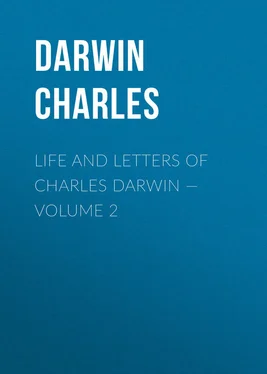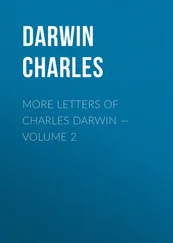Charles Darwin - Life and Letters of Charles Darwin — Volume 2
Здесь есть возможность читать онлайн «Charles Darwin - Life and Letters of Charles Darwin — Volume 2» — ознакомительный отрывок электронной книги совершенно бесплатно, а после прочтения отрывка купить полную версию. В некоторых случаях можно слушать аудио, скачать через торрент в формате fb2 и присутствует краткое содержание. Жанр: foreign_antique, foreign_prose, на английском языке. Описание произведения, (предисловие) а так же отзывы посетителей доступны на портале библиотеки ЛибКат.
- Название:Life and Letters of Charles Darwin — Volume 2
- Автор:
- Жанр:
- Год:неизвестен
- ISBN:нет данных
- Рейтинг книги:3 / 5. Голосов: 1
-
Избранное:Добавить в избранное
- Отзывы:
-
Ваша оценка:
- 60
- 1
- 2
- 3
- 4
- 5
Life and Letters of Charles Darwin — Volume 2: краткое содержание, описание и аннотация
Предлагаем к чтению аннотацию, описание, краткое содержание или предисловие (зависит от того, что написал сам автор книги «Life and Letters of Charles Darwin — Volume 2»). Если вы не нашли необходимую информацию о книге — напишите в комментариях, мы постараемся отыскать её.
Life and Letters of Charles Darwin — Volume 2 — читать онлайн ознакомительный отрывок
Ниже представлен текст книги, разбитый по страницам. Система сохранения места последней прочитанной страницы, позволяет с удобством читать онлайн бесплатно книгу «Life and Letters of Charles Darwin — Volume 2», без необходимости каждый раз заново искать на чём Вы остановились. Поставьте закладку, и сможете в любой момент перейти на страницу, на которой закончили чтение.
Интервал:
Закладка:
Have you seen Wollaston's attack in the 'Annals'? ('Annals and Magazine of Natural History,' 1860.) The stones are beginning to fly. But Theology has more to do with these two attacks than Science...
[In the above letter a paper by Harvey in the "Gardeners' Chronicle", February 18, 1860, is alluded to. He describes a case of monstrosity in Begonia frigida, in which the "sport" differed so much from a normal Begonia that it might have served as the type of a distinct natural order. Harvey goes on to argue that such a case is hostile to the theory of natural selection, according to which changes are not supposed to take place per saltum, and adds that "a few such cases would overthrow it [Mr. Darwin's hypothesis] altogether." In the following number of the "Gardeners' Chronicle" Sir J.D. Hooker showed that Dr. Harvey had misconceived the bearing of the Begonia case, which he further showed to be by no means calculated to shake the validity of the doctrine of modification by means of natural selection. My father mentions the Begonia case in a letter to Lyell (February 18, 1860): —
"I send by this post an attack in the "Gardeners' Chronicle", by Harvey (a first-rate Botanist, as you probably know). It seems to me rather strange; he assumes the permanence of monsters, whereas, monsters are generally sterile, and not often inheritable. But grant his case, it comes that I have been too cautious in not admitting great and sudden variations. Here again comes in the mischief of my ABSTRACT. In the fuller MS. I have discussed a parallel case of a normal fish like the monstrous gold-fish."
With reference to Sir J.D. Hooker's reply, my father wrote:]
Down, [February 26th, 1860].
My dear Hooker,
Your answer to Harvey seems to me ADMIRABLY good. You would have made a gigantic fortune as a barrister. What an omission of Harvey's about the graduated state of the flowers! But what strikes me most is that surely I ought to know my own book best, yet, by Jove, you have brought forward ever so many arguments which I did not think of! Your reference to classification (viz. I presume to such cases as Aspicarpa) is EXCELLENT, for the monstrous Begonia no doubt in all details would be Begonia. I did not think of this, nor of the RETROGRADE step from separated sexes to an hermaphrodite state; nor of the lessened fertility of the monster. Proh pudor to me.
The world would say what a lawyer has been lost in a MERE botanist!
Farewell, my dear master in my own subject,
Yours affectionately, C. DARWIN.
I am so heartily pleased to see that you approve of the chapter on Classification.
I wonder what Harvey will say. But no one hardly, I think, is able at first to see when he is beaten in an argument.
[The following letters refer to the first translation (1860) of the 'Origin of Species' into German, which was superintended by H.G. Bronn, a good zoologist and palaeontologist, who was at the time at Freiburg, but afterwards Professor at Heidelberg. I have been told that the translation was not a success, it remained an obvious translation, and was correspondingly unpleasant to read. Bronn added to the translation an appendix of the difficulties that occurred to him. For instance, how can natural selection account for differences between species, when these differences appear to be of no service to their possessors; e.g., the length of the ears and tail, or the folds in the enamel of the teeth of various species of rodents? Krause, in his book, 'Charles Darwin,' page 91, criticises Bronn's conduct in this manner, but it will be seen that my father actually suggested the addition of Bronn's remarks. A more serious charge against Bronn made by Krause (op. cit. page 87) is that he left out passages of which he did not approve, as, for instance, the passage ('Origin,' first edition, page 488) "Light will be thrown on the origin of man and his history." I have no evidence as to whether my father did or did not know of these alterations.]
CHARLES DARWIN TO H.G. BRONN. Down, February 4 [1860].
Dear and much honoured Sir,
I thank you sincerely for your most kind letter; I feared that you would much disapprove of the 'Origin,' and I sent it to you merely as a mark of my sincere respect. I shall read with much interest your work on the productions of Islands whenever I receive it. I thank you cordially for the notice in the 'Neues Jahrbuch fur Mineralogie,' and still more for speaking to Schweitzerbart about a translation; for I am most anxious that the great and intellectual German people should know something about my book.
I have told my publisher to send immediately a copy of the NEW (Second edition.) edition to Schweitzerbart, and I have written to Schweitzerbart that I gave up all right to profit for myself, so that I hope a translation will appear. I fear that the book will be difficult to translate, and if you could advise Schweitzerbart about a GOOD translator, it would be of very great service. Still more, if you would run your eye over the more difficult parts of the translation; but this is too great a favour to expect. I feel sure that it will be difficult to translate, from being so much condensed.
Again I thank you for your noble and generous sympathy, and I remain, with entire respect,
Yours, truly obliged, C. DARWIN.
P.S. — The new edition has some few corrections, and I will send in MS. some additional corrections, and a short historical preface, to Schweitzerbart.
How interesting you could make the work by EDITING (I do not mean translating) the work, and appending notes of REFUTATION or confirmation. The book has sold so very largely in England, that an editor would, I think, make profit by the translation.
CHARLES DARWIN TO H.G. BRONN. Down, February 14 [1860].
My dear and much honoured Sir,
I thank you cordially for your extreme kindness in superintending the translation. I have mentioned this to some eminent scientific men, and they all agree that you have done a noble and generous service. If I am proved quite wrong, yet I comfort myself in thinking that my book may do some good, as truth can only be known by rising victorious from every attack. I thank you also much for the review, and for the kind manner in which you speak of me. I send with this letter some corrections and additions to M. Schweitzerbart, and a short historical preface. I am not much acquainted with German authors, as I read German very slowly; therefore I do not know whether any Germans have advocated similar views with mine; if they have, would you do me the favour to insert a foot-note to the preface? M. Schweitzerbart has now the reprint ready for a translator to begin. Several scientific men have thought the term "Natural Selection" good, because its meaning is NOT obvious, and each man could not put on it his own interpretation, and because it at once connects variation under domestication and nature. Is there any analogous term used by German breeders of animals? "Adelung," ennobling, would, perhaps, be too metaphysical. It is folly in me, but I cannot help doubting whether "Wahl der Lebensweise" expresses my notion. It leaves the impression on my mind of the Lamarckian doctrine (which I reject) of habits of life being al-important. Man has altered, and thus improved the English race-horse by SELECTING successive fleeter individuals; and I believe, owing to the struggle for existence, that similar SLIGHT variations in a wild horse, IF ADVANTAGEOUS TO IT, would be SELECTED or PRESERVED by nature; hence Natural Selection. But I apologise for troubling you with these remarks on the importance of choosing good German terms for "Natural Selection." With my heartfelt thanks, and with sincere respect,
I remain, dear Sir, yours very sincerely, CHARLES DARWIN.
CHARLES DARWIN TO H.G. BRONN. Down, July 14 [1860].
Dear and honoured Sir,
On my return home, after an absence of some time, I found the translation of the third part (The German translation was published in three pamphle-like numbers.) of the 'Origin,' and I have been delighted to see a final chapter of criticisms by yourself. I have read the first few paragraphs and final paragraph, and am perfectly contented, indeed more than contented, with the generous and candid spirit with which you have considered my views. You speak with too much praise of my work. I shall, of course, carefully read the whole chapter; but though I can read descriptive books like Gaertner's pretty easily, when any reasoning comes in, I find German excessively difficult to understand. At some FUTURE time I should very much like to hear how my book has been received in Germany, and I most sincerely hope M. Schweitzerbart will not lose money by the publication. Most of the reviews have been bitterly opposed to me in England, yet I have made some converts, and SEVERAL naturalists who would not believe in a word of it, are now coming slightly round, and admit that natural selection may have done something. This gives me hope that more will ultimately come round to a certain extent to my views.
Читать дальшеИнтервал:
Закладка:
Похожие книги на «Life and Letters of Charles Darwin — Volume 2»
Представляем Вашему вниманию похожие книги на «Life and Letters of Charles Darwin — Volume 2» списком для выбора. Мы отобрали схожую по названию и смыслу литературу в надежде предоставить читателям больше вариантов отыскать новые, интересные, ещё непрочитанные произведения.
Обсуждение, отзывы о книге «Life and Letters of Charles Darwin — Volume 2» и просто собственные мнения читателей. Оставьте ваши комментарии, напишите, что Вы думаете о произведении, его смысле или главных героях. Укажите что конкретно понравилось, а что нет, и почему Вы так считаете.












